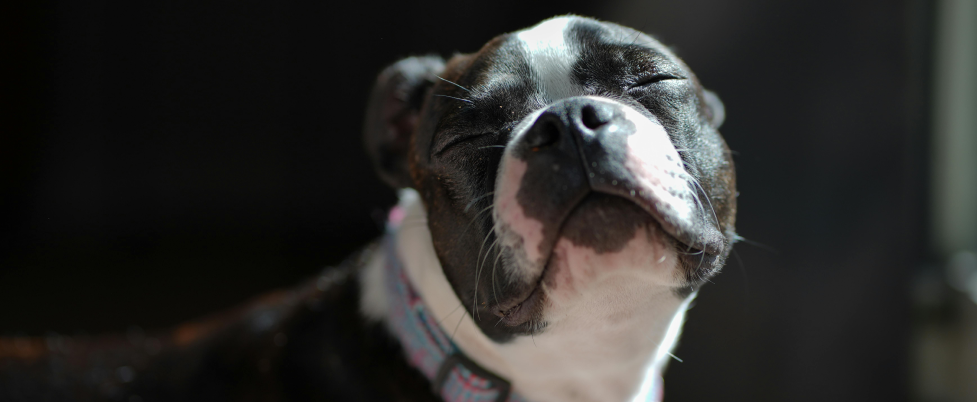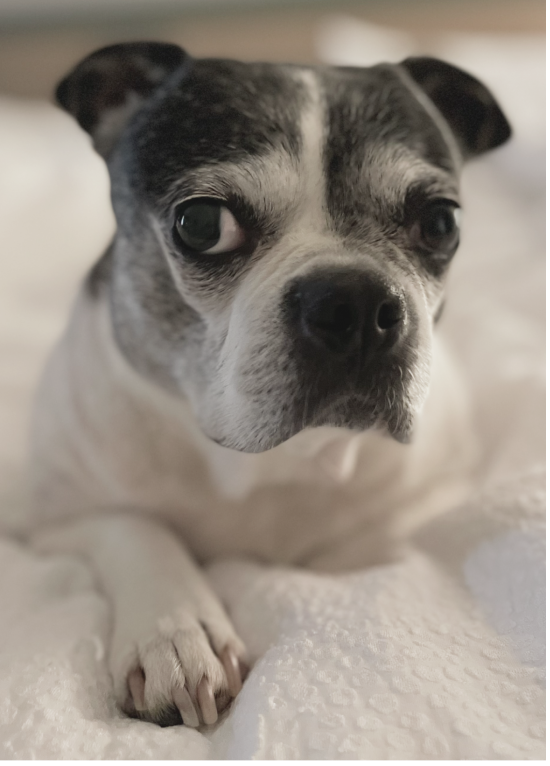TRAINING & BEHAVIOR / BEHAVIORAL HELP

Disclaimer: I am not a veterinarian. The following advice is based on general knowledge about Boston Terriers and common practices in pet care. Always consult with a professional veterinarian if you’re concerned about your pet’s health or behavior.
Introduction: Understanding Flatulence in Boston Terriers
Flatulence, commonly known as farting, is a natural bodily function but can be uncomfortable and embarrassing. Boston Terriers, with their short snouts and sensitive digestive systems, are prone to gas and bloating.
Boston owners know only too well that a BT fart can clear a room!
Why Do Boston Terriers Get Gassy?
- Anatomy and Digestion
- Short-muzzled dogs (brachycephalic) are more likely to swallow air while eating, which can lead to increased gas.
- Dietary Issues
- Some foods are harder to digest, causing gas buildup. Common culprits include human foods like cheese, ice cream or any dairy products. Also high-protein diet or too much meat could also cause excess gas.
- Food Sensitivities or Allergies
- Your Boston may have sensitivities to certain ingredients that can be found in dry dog food, such as soy, corn, or grains, leading to gas.
- Increased Stress or Anxiety
- Anxiety or stress can affect digestion, leading to excessive gas.
How to Reduce Your Boston’s Flatulence
1. Adjust Their Diet
- High-Quality Food
- Feed your Boston Terrier high-quality, easily digestible food that doesn’t contain fillers like corn or soy. Opt for natural, meat-based dog food.
- Avoid Gas-Inducing Foods
- Steer clear of foods that commonly cause gas, such as beans, broccoli, cabbage, and dairy products.
- Feed Smaller, More Frequent Meals
- Instead of one large meal, divide your Boston’s food intake into smaller, more frequent meals to reduce the chances of indigestion.
- Probiotics for Digestion
- Incorporate probiotics that are created for dogs into their diet, either through supplements or food, to improve gut health and reduce gas.
2. Choose the Right Treats
- Select Low-Gas Treats
- Choose dog treats that are gentle on the stomach, avoiding treats with artificial flavors or preservatives that may cause digestive upset.
- Limit Table Scraps
- Avoid feeding your Boston table scraps, especially rich or fatty foods, which can contribute to gas and stomach discomfort. Most human food is too rich and fatty for a dog’s digestive system to handle properly.
How to Prevent Excessive Swallowing of Air
1. Slow Down Feeding
- Use Slow Feeders or Puzzle Bowls
- Slow feeder bowls or puzzle feeders encourage your dog to eat more slowly, reducing the amount of air swallowed while eating.
2. Avoid Stressful Eating Environments
- Peaceful Eating Space
- Make sure your dog eats in a calm, distraction-free environment. Stressful surroundings can increase gas and digestive issues.
Signs Your Boston’s Flatulence May Be a Bigger Issue
Persistent or Severe Symptoms
- If your dog’s gas is accompanied by vomiting, diarrhea, or a lack of appetite, consult a vet as it may indicate an underlying digestive issue.
Signs of Bloating or Distention
- Bloating is a serious condition that requires immediate attention from a vet, especially if your dog’s abdomen becomes enlarged or painful.
When to Consult a Vet
Chronic Digestive Problems
- If your Boston experiences frequent or severe flatulence despite dietary adjustments, seek veterinary advice.
Health Conditions
- Conditions like gastrointestinal disorders, food allergies, or parasites can lead to chronic gas and bloating.
Home Remedies and Solutions for Flatulence in Boston Terriers
1. Natural Supplements
- Digestive Enzymes
- You can add digestive enzyme supplements to help break down food more efficiently and reduce gas production.
- Pumpkin dog supplements
- Pumpkin supplements made for dogs can also be helpful to calm your Boston’s stomach and improve digestion
- Activated Charcoal
- Some pet owners use activated charcoal as a remedy to absorb excess gas, but it’s important to consult your vet before using this method
- Natural Yogurt
- You can try adding a little natural yogurt to your Boston’s food, which introduces beneficial bacteria that support a healthy gut. For dogs with mild stomach issues, a small amount of plain yogurt can help soothe their digestive system.
2. Herbal Remedies
- Peppermint and Ginger
- Peppermint and ginger can help soothe your dog’s digestive system and reduce gas.
- Ginger can be peeled, finely chopped and sprinkled on your dog’s food in small amounts.
- A small amount of fresh or dried mint leaves can also be sprinkled in your Boston’s food, no more than a couple of leaves. Never use artificial mint in any form since that is toxic to dogs.
Preventing Flatulence with Lifestyle Changes
- Regular Exercise
- Ensure your Boston gets enough physical activity, which helps improve digestion and reduce bloating.
- Hydration
- Keep your dog well-hydrated, as dehydration can contribute to digestive problems and exacerbate flatulence.
Conclusion: Have a Plan and be Consistent
Managing flatulence in your Boston Terrier can be a straightforward process with the right dietary adjustments, slow feeding practices, and occasional use of supplements. By paying attention to your dog’s specific triggers and making small lifestyle changes, you can help reduce their gas and keep their tummy happy. Always consult with a vet for persistent issues, and stay patient with your pup while working towards a solution.

Additional Resources
PetMD – Why your dog farts and what to do about it
Other articles by this author

“Hi! I’m Weezie, a spirited Boston Terrier / French Bulldog mix and self-proclaimed expert on everything Boston.
- Article 1
- Article 2
- Article 3